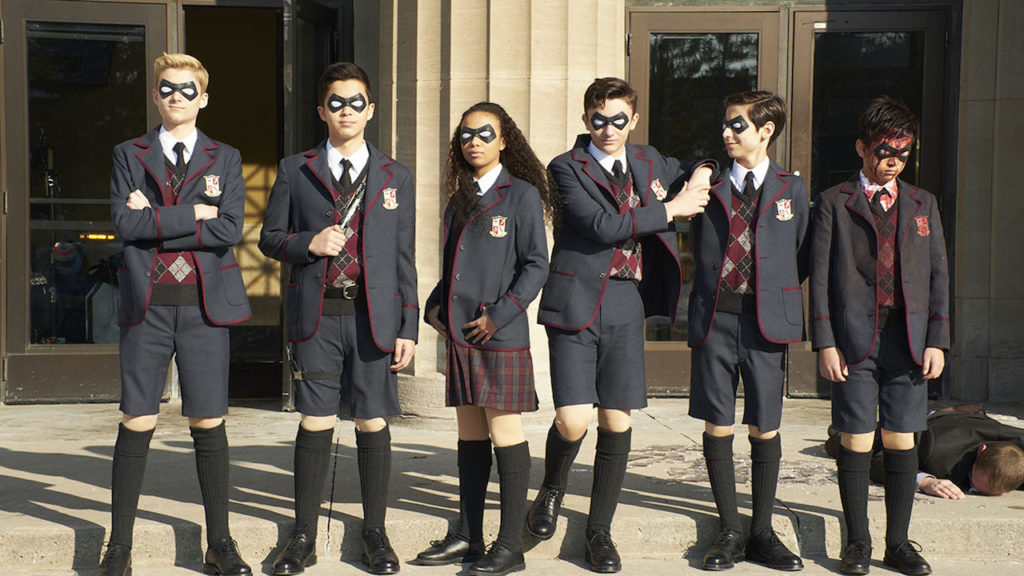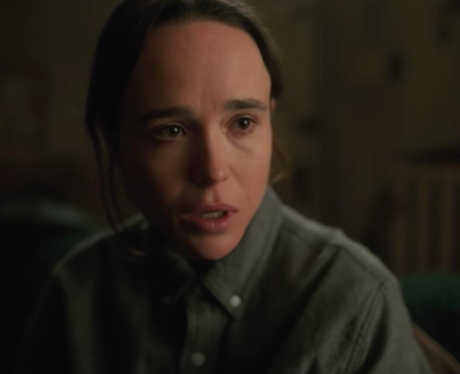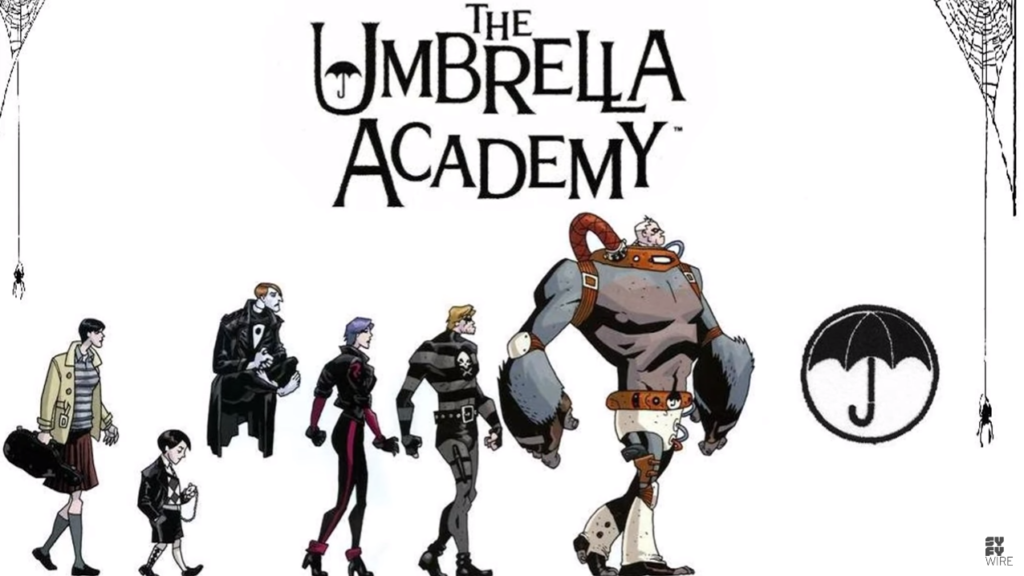
Based on the Eisner Award winning Dark Horse comic by ‘My Chemical Romance’ singer Gerard Way and artist Gabriel Ba. ‘The Umbrella Academy’ is the story about a dysfunctional family of superheroes, who reluctantly reunite at their father’s funeral. Together, they learn from a long-lost sibling, that they have only a few days to prevent the end of the world.
The first season of Umbrella Academy combines storylines from the first two trade paperbacks: Apocalypse Suite and Dallas. And while the tone of the series remains faithfully bizarre, it’s also more palatable – with much of the storyline getting an overhaul of the more ridiculous elements of the comic (Like Martian primates. Or largescale battles against national monuments), while all the while, focusing more on characterization. The main plot of season one primarily focuses on the storylines of numbers five and seven – whose chronicles drive most of the season-long conflict.
And while the series is never shy on oddities or adding episode-by-episode
mystery, it also fails to resolve many issues by seasons end.
The series starts by birth: forty-three children born from women with spontaneous pregnancies across the world, all at the same date and time.
Seven of them are adopted into the illustrious ‘Umbrella Academy’, a school run by peculiar philanthropist, Sir Reginald Hargreeves. An eccentric billionaire with but one intention: save the world. These seven would later grow up to be dysfunctional adults, reluctant superheroes forced to come together only to grow apart.
Now, the first few minutes meeting the family within the series opening are nothing shy of exhilarating. Introducing five of the academy children with a ‘Phantom of the Opera’ styled introduction.
The beginning of the Umbrella Academy series rings like a rock opera about superheroes. It’s certainly exciting to watch, and very much in tune to Gerard Way’s style.
Meet Your Heroes

Saving the world from what, is a question the series doesn’t answer directly. Instead, most of the story is a chronicle of interpersonal narratives that juggles troubling father issues, the pains of growing up under celebrity spotlight, time travel, and the mysterious organization that polices it – the main characters, showcasing their many oddities and crazy characteristics to the audience. Indeed, the show never shies on showcasing the kids playing with their powers – something which converts into some serious conflicts within their adult lives.

It’s odd to admit this but Luther (#1), is more visually appealing in the show compared to the comic. It’s one of the biggest changes but works well for the series. He’s a good leader, but one who hasn’t had the opportunity in years, living for years on the moon because of a cause no one believes in anymore. He has a large stature and commanding strength, but his nobility is a little blunt in world layered within shades of grey.

Diego (#2) is what you get when you mix Bullseye’s skills from Daredevil with Nightwing’s independence from Batman. He’s nimble, but a hothead. One who’s constantly butting heads with Luther.

Alison (#3) is a celebrity. Her entire life handed to her because of a special ability to mind control people by spreading a ‘rumor’. However, it’s a power she’s been caught abusing, causing her divorce, and forcing her to lose custody of her child. Her and Luther have had feelings for each other, since they were kids.

Klaus (#4) is a wise-cracking drug addict who can seance with the dead. A superpower which left him rather traumatized, as Hargreeves never went easy training him as a child. He’s constantly trying to score drugs as its an easy way of silencing the dead’s voices in his head.

Klaus can occasionally interact with Ben (#6), his brother who died while at the academy. Ben serves mostly as Klaus voice of reason and indefinite companion. Trying his best to keep his brother sober to help the family.

Number 5 (#5) is from the future. He warns the family about the end of the world. He can jump through space and time, though had accidentally taken himself to the apocalypse at the age of 13. He has lived a full-life since then, working for a mysterious organization who is currently, on the hunt for him. He is also much older than he appears.

Vanya (#7) was the only member seemingly without powers on the show. She’s been isolated from her siblings her entire life, kept under close eye to Hargreeves, yet never allowed to participate. As a result, she wrote a scathing book about her experiences with her family.
The Takeaway
Gerard Way is no stranger to storytelling. ‘I Brought You My Bullets, You Brought Me Your Love’ was one of my favorite albums as a teen, largely in part of the vampire adaptive storyline.
I’m not ashamed to admit that I loved My Chemical Romance and have been a fan of Gerard Way, longer than I care to admit. Umbrella Academy is filled with a style reminiscent of the Black Parade days. It’s weird and eccentric and very in your face bizarre.
It also takes inspiration from other comics, Doom Patrol being the most obvious. Likewise, Diego is definitely a take on a Batman acolyte sort of persona, and Vanya’s storyline is very similar to The Dark Phoenix saga.

It’s fascinating to watch, yet showcases a problem I’ve had with Umbrella academy since its beginning: the series is utterly aimless. It would seemingly introduce elements for the sake of seeming hip like strange orchestral death cults or a zombie driven Eifel Tower Space Ship, yet did not have an organic fit for these things into the story.
However, much of this style was also omitted from the tv series because it lacked context. Umbrella Academy is a comic about style over substance. And while the show’s iteration is definitely more cohesive, I still think it lacks a sense of direction moving forward.
By the end of the season, I couldn’t help but question what we had accomplished besides taking the viewers along for a wild ride. Like a concert, the series is great for being loud and making momentous statements, with personal story arcs within these in-between moments of rest – yet to what purpose, is a different story.
This isn’t a straightforward TV series. It’s more along the lines of AMC’s Preacher, if you’re into character piece narratives with a plot that doesn’t actually matter. The real story is about the family. The organizations, time travel, and end of the world? Actually, don’t really matter… nor do they make a whole lot of sense moving forward.
Showrunner, Steve Blackman, known from such hits as Altered Carbon, Fargo, and Legion, is a large reason why the adaptation has gone well. Even the musical influence, which I’d assumed had been Gerard Way, were also choices made by Blackman. Though he’s done a great job adapting the material I can see a wall on the horizon soon.
I think the problems of the series are best showcased in the reception to the shows season finale and how it differs from the comic books. It’s not the best episode, however, I think it highlights the show’s biggest shortcoming: that there is no real plan for Gerard Way’s eight-volume series.
Let me also throw this out there: the first issue of Umbrella Academy came out in 2007. The first issue of the third volume just came out in October of 2018. It’s been one season, but The Umbrella Academy has already adopted the first two volumes between Vanya’s saga and Number Five’s story with the organization. The only real written material left… is in this year’s volume three. And while there is an outline moving forward, there’s a universal difference between working with an actual script/produced comic versus dealing with a loosely adapted outline/treatment.
This is not to detract from the series. But there was always that bothered me when Umbrella Academy got the greenlight for the series. It’s a rather incomplete story for an adaption, and we’re already starting to hit Game Of Thrones season eight territory… where we’re almost out of material.
